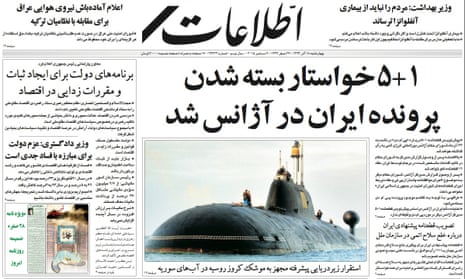Iran’s Ettelaat newspaper has strongly objected to the state’s ban on publishing the name or images of a former reformist president, Mohammad Khatami.
In an unprecedented move underlying the complexities of Tehran’s internal politics, the managing editor of the state-run newspaper, with nearly 90 years of history, wrote a front-page editorial on Wednesday stating that the ban is against the country’s constitution, which prohibits censorship.
The article, published in the form of a public letter addressed to President Hassan Rouhani, is written by the editor, Seyed Mahmoud Doaei, a reformist cleric who has urged him to intervene and defend the media against a serious threat to press freedom imposed by the hardline judiciary.
Ettelaat’s article on Wednesday mentioned Khatami’s full name no less than three times. “The esteemed prosecutor of Tehran held a meeting with a number of managing editors including myself recently, in which he demanded us not to publish articles or images relating to Hojatoleslam [an Islamic honorific title] Khatami,” Doaei wrote in the article. “I told him in that very meeting that this decision is arbitrary; there is no legislation or law backing it and that Ettelaat would not accept it.”
The extent of the restrictions has prompted disquiet among the media in Iran, even leading the traditionally passive state-owned publication to speak out. Ettelaat usually follows a middle line, avoiding sensitive political matters. It emerged earlier this year that a media blackout had been imposed regarding Khatami, who fell foul of establishment over his support for opposition leaders and former presidential candidates Mir-Hossein Mousavi and Mehdi Karroubi, who have been under house arrest since February 2011. Mousavi’s wife, Zahra Rahnavard, a prominent opposition figure, is also under house arrest.
The ban was imposed not by the Rouhani government but by the hardline judiciary and its media watchdog, which act independently of the administration. But Rouhani is bound under the Iranian constitution to speak out and defend people’s rights , and critics say he has been acting too passively on the matter.
Ettelaat first defied the ban on Saturday, printing the Farsi translation of an interview Khatami has recently given to As-Safir, an Arabic newspaper based in Lebanon. Khatami’s image was also published alongside the interview. On Tuesday, news agencies affiliated to the judiciary reported that Doaei was indicted for ignoring the ban, insisting the restrictions on mentioning Khatami’s name and images remained in place. Ettelaat has since published other news about Khatami and said it will keep doing so despite threats of prosecution. It is not clear if Doaei has been formally summoned to a court.
This is paricularly intriguing: Doaei has been appointed directly by the country’s supreme leader, Ayatollah Ali Khamenei, who has the ultimate power, as his representative. Ettelaat also publishes in English and has a monthly magazine published in French, called La Revue de Téhéran, which is aimed at introducing Iran’s culture and art to the Francophones.
It is not the first time the authorities have banned mentions of Khatami in the Iranian media. In 2010, a similar ruling was issued against publishing his name or image, as well as those of Mousavi, Rahnavard and Karroubi. Restrictions were relaxedduring the last presidential elections in 2013. Khatami backed Rouhani in those elections and his support was crucial in the victory of the moderate cleric. Following Rouhani’s win, Khatami wrote an article for the Guardian in which he urged the west to work with the new president in order to end the standoff over Tehran’s nuclear programme.
The Islamic republic’s constitution has explicitly made clear that censorship is prohibited but the country has one of the world’s worst records of press freedom, with dozens of journalists and bloggers currently held behind bars. Many Iranian journalists, like those working for the BBC’s Persian service, cannot return to their country for fear of arrest. Other methods of harassing journalists include barring them from leaving the country, confiscating their passport and summoning them for interrogation.
Among those held in jail is Jason Rezaian, a Iranian-American Washington Post journalist who has been held for more than a year on charges of spying. His fate remains unclear.

Comments (…)
Sign in or create your Guardian account to join the discussion